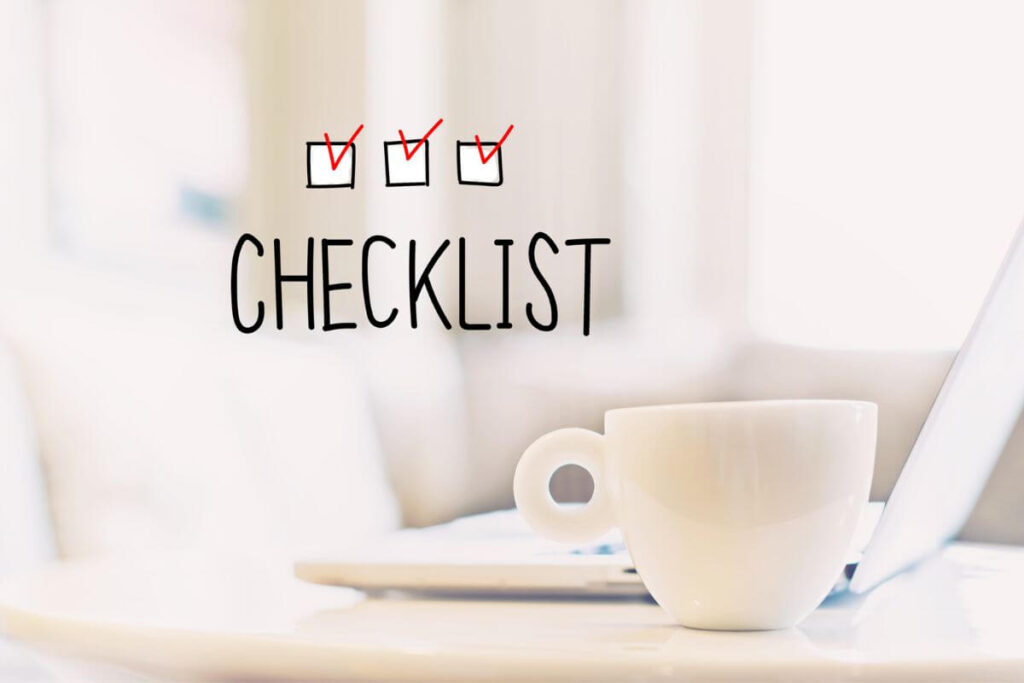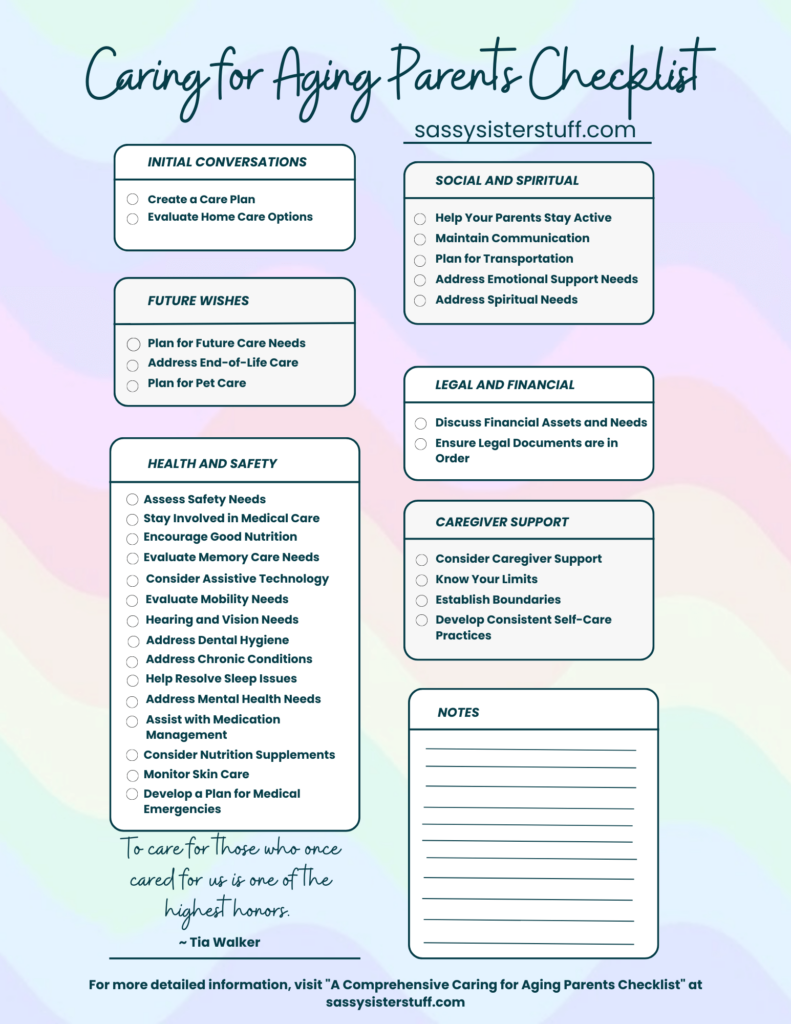A Comprehensive Caring for Aging Parents Checklist
Caring for aging parents can be a challenging and emotional experience, but it is a natural part of life for many individuals — including me.
As our parents age, they may require more support and assistance with everyday tasks, from managing their finances to maintaining their health. It can often become a full-time job.
To ensure that your aging parents receive the best care possible, it’s important to create a comprehensive checklist that outlines all of their needs and preferences.
The checklist should cover everything from medical appointments and medication management to emotional support and social engagement.

By having a clear plan in place, you can better navigate the often-complicated process of caring for aging parents and ensure that their needs are met with compassion and care.
I’ve developed a 31-point comprehensive and thorough checklist to help you plan and care for your aging parents. Use it to guide you through the process of developing a care plan for your elderly parents so you don’t miss anything.
Related Article: 9 Key Benefits of Living with Elderly Parents
The Ultimate Checklist for Caring for Aging Parents
Since I’ve been a caregiver for my aging parents, and other family members, I genuinely believe this checklist is the most thorough and comprehensive available. It has been developed based on my years of personal experience as well as extensive research.
You’ll find that I’ve divided the 31-points into 6 areas:
- Initial Conversations with Your Parents
- Future Wishes
- Health and Safety
- Social and Spiritual Wellness
- Legal and Financial Issues
- Caregiver Support
In this article, I provided as many examples as possible where I felt it would be helpful. If you have questions that are not addressed below, please feel free to contact me via email or any of my socials and I’ll be glad to answer your questions to the best of my ability.
We all want to think of our parents as being capable of independent living forever, but sadly it doesn’t always happen like that. Therefore, the more we can prepare for and learn, the better we will be able to help our parents during these years.
Caring for an aging parent is different for everyone, so let’s support each other however possible. I hope this article and checklist help you!
Related Article: 21 Essential Tips for Dealing with Irrational Elderly Parents

Caring for Aging Parents Checklist: Initial Conversations
1. Create a Care Plan: You’ll want to develop a care plan with your aging parents that outlines their current health status, potential future care needs, financial resources, estate planning, and preferred living arrangements. This plan should include a list of healthcare providers, medical conditions, and medications. It may be beneficial to talk to your parents’ doctors, as well. However, it’s vitally important to include your parents in this process so they feel valued and empowered.
2. Evaluate Home Care Options: If your aging parents are currently remaining in their home, consider home care options such as a caregiver, home health aide, or companion, if necessary. If they are no longer going to be able to remain in their home, begin discussing options such as assisted living facilities, nursing homes, and senior communities. You’ll want to discuss these issues early so you don’t have to make decisions for your parents without knowing their wishes and involving them in decisions. It will help avoid hard feelings and conflicts.

Caregiving for Elderly Parents Checklist: Future Wishes
3. Plan for Future Care Needs: It’s important to consider future care options, such as assisted living or long-term care, and develop a plan to pay for these expenses. This may include purchasing long term care insurance, setting up a trust, and Medicaid planning. Be sure to have an overall understanding of your parents’ wishes in their later years of life. Know how they want to live and what’s most important to them. This might be a good time to visit potential places and become familiar with what’s available for your parents.
4. Address End-of-Life Care: It’s also important to have conversations with your aging parents about their end-of-life care preferences, including their wishes for life-sustaining treatments and where they would like to receive end-of-life care. Consider completing an advance directive with your aging parents to ensure that their wishes are honored. You can talk to a lawyer, get the documents from a doctor or hospital, or find advance directive outlines online. Know your parents’ wishes for this difficult time of life.
5. Plan for Pet Care: If your aging parents have pets, consider how their care will be managed and make arrangements for their care if needed. Allow your parents to be involved in these plans.

Caring for Elderly Parents Checklist: Health and Safety
6. Assess Safety Needs: You should identify potential safety risks in your parents’ home and make modifications to reduce these risks. This may include installing handrails, grab bars, a shower seat, or non-slip flooring in the bathroom, kitchen, and stairs. While it can be costly, the benefits far outweigh the risks of injury. You can save money by doing some of the modifications yourself, but this can be time-consuming.
7. Stay Involved in Medical Care: Be sure to go to medical appointments with your parents and ensure they are following their prescribed treatment plan. Keep a list of their medications and ensure they are taking them as directed. Know how to contact their doctors when necessary.
Maintain a schedule of your parents’ medical appointments—whether it’s eye care appointments, visiting a dentist or oral surgeon for dental issues, or general wellbeing checks. Be sure to have access to health insurance information, social security disability insurance, and Medicare.
It’s best if you can communicate with your parents’ doctors via a portal or email when necessary. You could potentially have many questions about medications and how to best care for them.
8. Encourage Good Nutrition: You’ll want to provide support for your aging parents to ensure they are eating a healthy diet and staying hydrated. You may also consider hiring a meal delivery service or a caregiver to help with meal planning and preparation. It can be quite time-consuming. There are also supplemental nutrition assistance programs in some areas that might be helpful if your parents require a specialized diet.
9. Evaluate Memory Care Needs: If your aging parents have memory impairment or dementia, consider specialized memory care services, including adult day programs or memory care facilities. If you have concerns about their memory, you should ask their doctor for a referral to a neurologist and/or neuropsychologist who can assess the situation.
10. Consider Assistive Technology: You may want to explore the use of assistive technology to help your aging parents live more independently, such as medication reminders, emergency response systems, or home monitoring systems. Again, doctors and therapists can make recommendations. Don’t feel like you must do all the research and learn about everything without support.
11. Evaluate Mobility Needs: Aging parents may have mobility issues that require additional support, such as a walker, cane, or wheelchair. You’ll want to consider how to address these needs, including purchasing or renting equipment. I know from experience that adjustable bedframes make life easier (and safer) for everyone. The time may also come when you need to learn what to do when your elderly parent can no longer walk and you’ll need to navigate that path.
12. Hearing and Vision Needs: Your aging parents may have hearing or vision impairment that requires additional support, such as hearing aids or glasses. Make sure to address these needs and ensure they are using the appropriate devices. There are hearing and vision specialists in most areas nowadays and I’ve found them extremely helpful and friendly. They deal with older patients all day and know how to relate to them.
Related Article: 79 Uplifting Quotes About Caring for Elderly Parents
13. Address Dental Hygiene: Aging parents may have difficulty maintaining good dental hygiene, which can lead to dental issues and overall health problems. Ensure that they are receiving appropriate dental care and that they are following good dental hygiene practices. Make sure they have a provider who specializes in geriatric dental care.
14. Address Chronic Conditions: Your aging parents may have chronic conditions that require ongoing management, such as diabetes or heart disease. Ensure that these conditions are being managed appropriately and that your parents are following their treatment plan. Stay in touch with the doctors who treat them for these conditions.
15. Help Resolve Sleep Issues: Many elderly people have difficulty sleeping, which can impact their overall health and well-being. If you parents suffer from this problem, consider addressing sleep issues with your healthcare provider and helping them find ways to improve sleep quality. They may need an adjustable bedframe, a new mattress, medications, or a new bedtime routine.
16. Address Mental Health Needs: Elderly people often experience mental health issues such as anxiety or depression. If your parents have symptoms of these conditions, please ensure that they receive appropriate mental health care and support. They may be resistant to talking with a professional since it can be a sensitive topic, so you might need to gently nudge them a bit.
17. Assist with Medication Management: This is something I’ve been doing with my parents for years. I worry about them taking their medications correctly, which can lead to adverse health outcomes. Unfortunately, aging parents often have difficulty managing their medications. You should consider how to support medication management, including using a pill organizer, setting reminders, or hiring a caregiver. I use a CVS App on my phone to manage refills.
18. Consider Nutrition Supplements: Aging parents may require additional nutrition supplements, such as protein or vitamins, to support their health. You’ll want to talk to their doctor to ensure that they are receiving appropriate supplements and that they are taking them as directed.
19. Monitor Skin Care: Elderly people are very prone to skin issues such as dryness or bruising. I would monitor their skin very carefully and regularly to avoid serious problems. Make sure that they are receiving appropriate skin care, including moisturizing and protection from the sun.
20. Develop a Plan for Medical Emergencies: Aging parents are always at risk for medical emergencies so you should have a plan in place for managing emergencies, including access to emergency medical services and a list of emergency contacts. You may want to invest in call-in services that will send help to the home, or contact designated people for less serious crises. I prepared a Go Bag for emergencies at my parents’ house. It includes items such as a medication list, insurance cards, credit cards, checks, money, personal care products that they prefer, and emergency contact information. If 911 must be called, everything they need is in the bag.

Related Article: 4 Essential Checklists for Moving Elderly Parents to Another State
Caring for Aging Parents Checklist: Social and Spiritual
21. Help Your Parents Stay Active: You should encourage your parents to stay active and engaged in their community. This can include participating in exercise classes, social activities, or volunteering. It can also include online social activities and clubs. Also, visit them as often as possible and enjoy activities together.
22. Maintain Communication: It’s important to stay in regular communication with your aging parents to ensure their needs are being met and to address any concerns or issues that may arise. This can include regular phone calls, visits, or video chats. Maintaining regular communication with them, and staying involved in their lives, will help prevent serious problems that linger for too long without attention.
23. Plan for Transportation: Consider transportation options for your aging parents, such as providing rides, arranging for public transportation, or hiring a transportation service. There are many options today, including car services such as Uber and Lift. You can make the arrangements for them and provide all the necessary information if you are unable to provide the transportation.
24. Address Emotional Support Needs: As aging parents go through the natural process of getting older, they often experience emotional challenges such as isolation, loneliness, or sadness. It’s important for you to provide them with the support they need by showing empathy, actively listening to their concerns, and validating their feelings. Regular check-ins and visits can also help them feel loved and cared for. Additionally, you should encourage them to engage in activities they enjoy and help connect them with a supportive community that promotes their emotional well-being. It’s important to approach their emotional needs with sensitivity and respect, and to seek professional help if necessary.
25. Address Spiritual Needs: Your aging parents may have spiritual or religious beliefs that they want to continue as they get older. To address their needs, be sure to respect their beliefs and values, have open conversations, encourage participation in spiritual activities, and help them connect with a faith community or leaders for support. This will promote their well-being and contentment.

Caring for Aging Parents Checklist: Legal and Financial
26. Discuss Financial Assets and Needs: Aging parents may have financial needs that require support, such as managing their finances, paying bills, or accessing benefits. Ensure that they have access to appropriate financial support, including working with a financial planner or elder law attorney, if necessary. Protect them from financial scams by monitoring their bank accounts and credit cards. Also, keep their legal documents and passwords in a safe place. You should also become an authorized user on your parents’ accounts. This will allow you to pay their bills if they are no longer able to do so. Be sure to have access to supplemental security income and retirement accounts, too.
27. Ensure Legal Documents are in Order: Work with your aging parents to ensure their legal documents are in order, including a will, power of attorney, healthcare proxy, and advance directives. This can help ensure their wishes are respected in the event of a medical emergency or death. Consider consulting with an attorney to help prepare these documents. Keep their important documents in a safe place. Collect, organize, and store important papers such as:
- Birth Certificate
- Deeds to property
- Deeds to cemetery plots
- Insurance Policies
- Pension benefits
- Military discharge papers
- Death certificate of a spouse
Related Article: 9 Important Daily Wellness Tips for Middle-Aged Women
Caring for Aging Parents Checklist: Caregiver Support
28. Consider Caregiver Support: Caregiving can be a demanding and stressful role. Please consider reaching out to support groups or respite care services to help manage caregiver stress and prevent burnout. You can also consider short-term care at a facility to give yourself a break, or ask for help from family members and loved ones.
29. Know Your Limits: Knowing your limits as a caregiver for your elderly parents is crucial to maintaining your own physical and mental well-being. In fact, understanding your limits will help you provide the best possible care for your parents. Recognizing when you are at your limit is a sign of responsible caregiving and can ultimately benefit both you and your parents. Remember, you can’t pour from an empty cup.
30. Establish Boundaries: It’s essential to set boundaries when caring for your elderly parents to maintain a healthy and balanced relationship. Boundaries can help prevent caregiver burnout and protect your own physical and emotional well-being. Moreover, setting boundaries can also help establish clear expectations, reduce conflicts, and provide a sense of structure and predictability for everyone.
31. Develop Consistent Self-Care Practices: Developing consistent self-care practices is vitally important. Self-care can take many forms, such as exercise, meditation, spending time with friends, or engaging in a hobby, and it should be prioritized just as much as caring for your parents. By prioritizing self-care, you can become a more effective caregiver, improve your well-being, and continue to provide support for your elderly parents.

Final Thoughts: Caring for Aging Parents Checklist
In conclusion, caring for aging parents is a complex and ongoing process. I hope this 31-point comprehensive checklist can make the process more manageable, and provide a starting point for planning and preparation, but you may need to modify it to meet your unique needs and circumstances.
By prioritizing your aging parents’ needs and preferences, and staying aware of their current and future needs, you can ensure that they receive the best possible care and support during this phase of their lives.
Remember, it’s important to take care of yourself as well, so don’t hesitate to reach out to friends, family, or professional caregivers for help when you need it. You can’t take care of your parents if you are run down or overwhelmed.
I promise, with a little planning and preparation, you can navigate the challenges of caring for aging parents with grace and compassion. But it’s best to start planning early.
Love to ALL! ~ Susan







